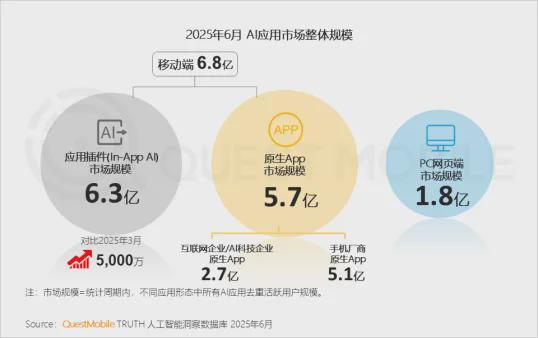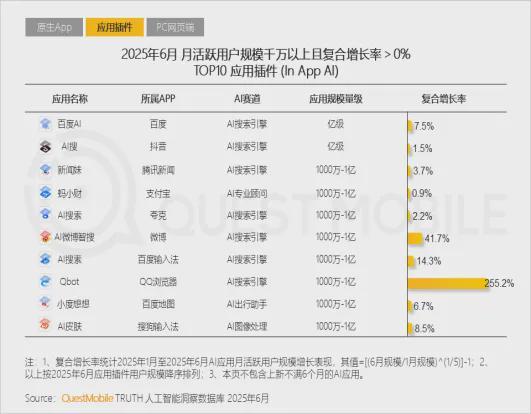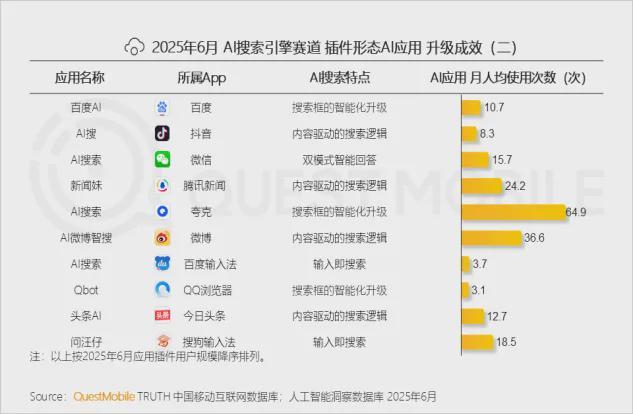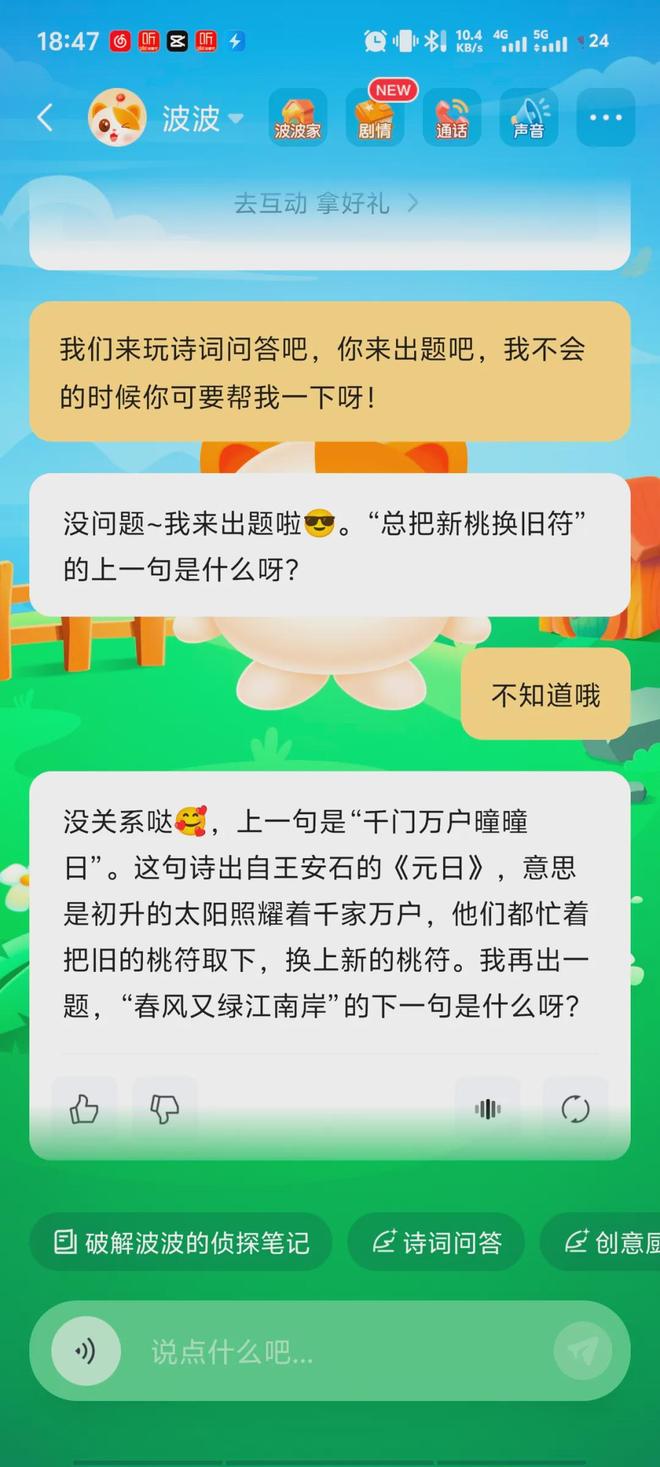"Invisible" AI Revolutionizes Platform Business Growth
![]() 08/27 2025
08/27 2025
![]() 529
529
Recently, I reviewed QuestMobile's semi-annual report on the AI application market and noticed an intriguing shift.
As of June this year, the market size of native apps and PC web pages had declined by 20 million and 30 million users, respectively, compared to March. Conversely, the number of AI plugins within various apps surged by an impressive 50 million users.

This is not merely a migration of users but a silent "vote with feet," where users are choosing platforms that seamlessly integrate intelligent services into their daily activities.
Behind this trend lies users' growing desire for efficient information acquisition. People are increasingly inclined to fulfill their needs in one place rather than switching between multiple applications.
From an industry perspective, this shift is redefining the competitive landscape. Competition among platforms is no longer solely about content volume or user base but has evolved into a race for service depth and efficiency.
From "Actively Opening" to "Effortless Access"
AI Plugins are Reshaping User Dependence
When you open the apps on your phone, you might not realize that the AI features hidden within search boxes and trending pages are subtly altering your reliance on these platforms.
TikTok users no longer need dedicated photo editing software; they can directly utilize built-in AI to optimize image textures, enhance beauty with a single click, and even generate AI photo portraits in various styles based on their photos.
Weibo users encountering trending topics they wish to delve into no longer need to leave the app to search elsewhere; Weibo AI Search provides comprehensive answers right within the platform.
Gaode Maps users no longer need to bother with route queries; they simply ask "Teacher Xiao Gao" for the best travel plan.
Quark's AI intelligent problem-solving function enables students to obtain clear explanations without switching to other tools when facing difficulties in problem-solving...
These scenarios share a common theme: users no longer need to specifically open an AI application but can effortlessly access intelligent services within familiar platforms.
These seemingly minor experience improvements are precisely the result of AI plugins' keen understanding of user habits.
While native AI products are powerful, they require users to actively download and open them, essentially asking users to change their existing habits. AI plugins, on the other hand, seamlessly integrate the core capabilities of native AI into existing platforms, enabling users to meet all their needs without switching apps.
More importantly, these AI plugins collectively point to a more efficient and precise mode of information acquisition. Rather than aimlessly browsing recommendations or searching for keywords, users can quickly extract truly useful content through AI.
Over time, users become accustomed to this convenience and can no longer do without it.
This change in user behavior is not just a subjective feeling but is supported by solid market data, particularly in the field of AI search engines, which are closely tied to users' daily information acquisition, showing outstanding performance.
According to QuestMobile's report data, from January to June this year, among the top 10 app plugins with a monthly active user base exceeding 10 million,
Qbot (QQ Browser) recorded a compound growth rate of 255.2%, while Weibo's AI Weibo Search ranked second with a compound growth rate of 41.7%. AI plugin applications on information/social media platforms such as Baidu, TikTok, and Quark also grew to varying degrees.

In terms of user frequency, the average monthly usage of Quark AI Search is 64.9 times per user, closely followed by Weibo AI Search at 36.6 times, and Tencent News at 24.2 times.

Effective AI Plugins
Become the "Value Amplifier" of the Platform
The convenience brought by AI plugins is merely superficial; their deeper significance lies in activating and amplifying the platform's inherent value.
A successful AI plugin is not just a simple aggregation of features but deeply integrates with the platform's core ecosystem and user scenarios, enabling the platform's inherent advantages to be fully unleashed and even creating new value growth points.
Take Weibo as an example; its core value lies in its ability to expose various trending events first, with a large user base discussing and sharing opinions, forming a vibrant information field. The emergence of Weibo AI Search amplifies this value.
A few days ago, the trending topic #Xu Yiyang gave up work for Huang Zitao# was popular. If you didn't follow the plot, you might not fully understand the gossip. Why suddenly give up work for love? Was it voluntary? How significant was the impact after giving up work?
A quick glance at Weibo AI Search reveals that Xu Yiyang stated in the variety show "Youngsters' Travel Swap" that she had reduced her work schedule to accompany Huang Zitao. Weibo AI Search clearly explains the background, reasons, career status of both parties, and the focus of controversy regarding giving up work.
Some pointed out that her reduction in announcements in 2021 coincided with the timeline of accompanying Huang Zitao. Others believed that Xu Yiyang was originally voluntarily under Huang Zitao's company at that time, and the so-called "giving up" was a privilege of the boss's wife. Her career had not reached its peak, and the extent of "giving up" was exaggerated.

Weibo AI Search doesn't search for information elsewhere but mines readily available media reports, user discussions, and interpretations by relevant bloggers on Weibo, sorts them out clearly with AI, and presents them to users. This is actually an important supplement to the recommendation algorithm, enabling users to filter out unnecessary information in the explosive information and understand the cause and effect more efficiently.
More crucially, this cross-verification based on authoritative information and diverse viewpoints within the platform significantly improves the accuracy of information.
For instance, the trending topic #12.3% of post-00s respondents have savings exceeding 300,000 yuan# caused anxiety and skepticism: Is this number reliable?
But if you easily click on the AI Search under the related entry, it will tell you: This survey only questioned 1,825 people, mainly concentrated in big cities like Beijing, Shanghai, Guangzhou, and Shenzhen, with most of them being young people in the internet and finance industries, which cannot represent the situation nationwide. It will also cite analyses from other financial bloggers and broader data to support its viewpoint, immediately making the "water content" of this viewpoint clear.

This ability to "accurately seek the truth" helps alleviate users' concerns about wanting to stay updated with trending topics but fearing misinformation, naturally making the platform more attractive.
Looking at Himalaya's "Bobo" voice assistant, its value amplification effect is reflected in empowering the platform's "audio content ecosystem".
As it is primarily targeted at children, "Bobo" adopts a soft and cute cartoon image design, and its voice tone is also playfully childlike, instantly closing the distance with children.
I have personally experienced interacting with it: When trying to play poetry quizzes, it came up with a line "Always replacing the old peach with the new one," and when I said "I don't know," it did not simply end the conversation but comforted me in a lighthearted tone, telling me that the previous line was "Thousands of doors and ten thousand households shining brightly," from Wang Anshi's "New Year's Day".

Besides poetry quizzes, it can also accompany children in playing idiom solitaire, guessing riddles, or providing real-time answers to encyclopedic questions and creating customized stories.
This "learning through play" model not only allows children to learn knowledge through relaxed interaction but also enables parents to see the unique value of the platform in educational scenarios, thereby amplifying Himalaya's competitiveness in vertical fields.
According to data disclosed by Himalaya, the user conversation retention of "Bobo" has increased by 300%, far exceeding the industry average, which is powerful proof that AI plugins activate the platform's inherent value.
In the long run, besides amplifying platform value, the existence of AI plugins is gradually promoting the transformation of industry competition logic.
Platforms are no longer merely pursuing the number and speed of trending topics but leveraging AI plugins to enhance the efficiency, quality, and accuracy of information interpretation, thereby winning users' long-term trust.
Because a platform that can provide precise services in the most natural way when users need them is often more irreplaceable than a simple content aggregation platform.
Ultimate Value
"Dimensional Upgrade" of Platform Commercialization Models
For any listed company, the ultimate value of technology integration must be reflected in product commercialization. The existence of AI plugins precisely brings the possibility of "dimensional upgrade" to platform commercialization models.
Take Weibo AI Search as an example. Weibo stated that the AI Search product significantly improved users' consumption experience under trending searches and the search satisfaction rate in active search scenarios. The daily active user count of AI Search in the second quarter increased markedly compared to the first quarter.
These user behavior data are precisely the advertising value that advertisers value most. They enable advertisements to be more precisely embedded in users' information consumption scenarios, thereby significantly improving exposure and conversion effects.
This point can be verified from Weibo's advertising revenue performance in the second quarter. The financial report showed that Weibo's advertising revenue for the quarter reached $383.4 million, equivalent to approximately RMB 2.756 billion.
In the first half of the year, clients in the food and beverage, footwear and apparel, and beauty industries significantly increased their focus on Weibo's new product, celebrity endorsement, and IP marketing. The revenue and number of projects in core scenarios such as new product launches and celebrity announcements increased by double digits year-on-year.
Additionally, as the platform's core operating indicators continue to improve, driven by AI Search, Weibo's long-term value is gaining recognition from more and more capital markets. Reflected in the stock price, both Weibo's Hong Kong and U.S. stock prices rose by more than 10% after the latest financial report was released.
Quark Search's AI plugins' deployment in vertical scenarios also demonstrates this "dimensional upgrade" logic.
As the college entrance examination season approaches, what candidates and parents need most is accurate and reliable guidance for college application. Through the intelligent application system, Quark College Entrance Examination clearly presents data such as past admission scores, employment prospects, and academic strength of various universities and majors, becoming a rigid demand tool for tens of millions of users. The huge traffic gathered in the college entrance examination scenario will eventually be precipitated into paid scenarios such as cloud storage and scanning, forming long-term lifecycle value.

This model of "acquiring customers through high-frequency rigid demand scenarios and monetizing through diverse service scenarios" enables commercialization to break through the limitations of a single function and form a more sustainable ecological closed loop.
Once such an ecosystem is established, it will create a strong industry barrier. The more users get accustomed to efficient and precise full-chain services, the harder it will be for them to return to the past model of constantly switching platforms and piecing together information themselves.
For the industry, this may mean that future competition will no longer be a competition of single functions or contents but a competition of overall service ecosystems and intelligence levels.
Platforms that can break functional barriers faster and achieve seamless service flow through AI are more likely to win users in this transformation and define new industry standards.
Conclusion
As AI evolves from an independent "tool" to a platform's "built-in capability," the value coordinate system of the entire internet is shifting.
Future platform competition is likely to be a covert battle of AI plugins—
Those who can more naturally embed intelligent services into user habits and transform their ecological advantages into intelligent capabilities will occupy a more favorable position in the new value coordinate system.
•END•







